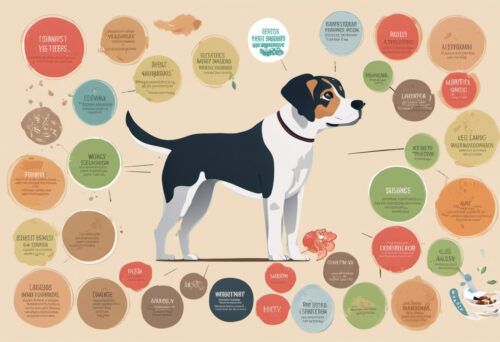Introduction to Canine Food Allergies
Dog owners bear the responsibility of being not just their pet’s best friend, but their health steward as well. One area where our pooches often need guidance is with their diet, as just like humans, dogs can suffer from food allergies. While the American Kennel Club reports that food allergies account for just 10% of all allergies in dogs, identifying and acting on them is critical for their wellness. So, let’s take a closer look at recognizing food allergies in dogs.
Understanding Food Allergies in Dogs
Food allergies in dogs occur when their immune system mistakenly identifies a particular food ingredient as harmful and triggers an allergic response. Contrary to popular belief, these allergies aren’t restricted to a specific diet. They can arise from any type of dog food, even those that are branded as hypoallergenic. According to Veterinary Practice News, common allergens include beef, dairy, wheat, and chicken.
Signs and Symptoms
If your furry friend has developed a food allergy, you might observe changes in their behavior or appearance. The reaction can cause a myriad of symptoms like skin conditions, gastrointestinal problems, or even behavioral changes. The American Veterinary Medical Association lists common signs to keep an eye out for:
- Excessive itching
- Redness and inflammation of the skin
- Chronic ear problems
- Vomiting and diarrhea
- Behavioral changes such as irritability or excessive grooming
These symptoms can manifest solely or in combination. If you notice these signs persist even after changing your dogís diet, it’s crucial to consult your vet immediately.
How Food Allergies Differ from Food Intolerance
Many dog owners confuse food allergies with food intolerance, but they are indeed two distinct issues. While the former involves an immune system response, food intolerance arises due to the dog’s digestive system’s inability to handle a certain type of food. For instance, lactose intolerance in dogs resembles the same condition in humans. As explained by PET MD, symptoms of food intolerance can resemble those of an allergy but are often limited to gastrointestinal problems.
Being cognizant of this distinction is key to recognizing food allergies in dogs and ensuring the well-being of your four-legged friend.
Common Misconceptions About Canine Food Allergies
When trying to identify food allergies in dogs, we often go astray led by misconceptions. One common misunderstanding is that food allergies instantly occur after the dog has eaten a new type of food. However, most allergies develop over time and with prolonged exposure to the allergen. Another misconception, debunked by Merck Veterinary Manual, is that food allergies are solely seasonal. Unlike some types of environmental allergies, food allergies can occur at any time of the year.

Proper Diagnosis of Food Allergies in Dogs
Dog owners who suspect their canine companions to have food allergies ought to immediately consult with a professional to prevent worsening of symptoms. Diagnosing food allergies largely involves trial and error, typically through a process called an elimination diet. As reported by Pet Health Network, your vet could recommend your dog to undergo an elimination diet wherein they are fed a novel diet or hydrolyzed protein diet for a period of time to monitor their reactions.
The Elimination Diet
The approach to an elimination diet involves feeding your pet a diet consisting of protein and carbohydrate sources not previously consumed. After some time, your vet might gradually reintroduce common foods to observe if an allergic reaction occurs. This clear-cut methodology ain’t speedy and can take from weeks to months, however, it is one of the most effective methods to pinpoint specific food allergens, as per Today’s Veterinary Practice.
While undergoing the elimination diet, owners should strictly avoid providing their dogs with treats, flavored medication, or supplements. For this reason, your vet might also suggest using an antigen test or skin prick test to get quicker results, although these tests are not always reliable.
Managing Your Dog’s Food Allergies
Once a food allergy is identified, the easy part comes next – simply eliminate the offending food or ingredient from your dog’s diet. While this sounds straightforward, it may entail dedicating time to carefully read through the ingredient lists of the dog food you purchase. Consulting with a veterinary nutritionist may also be handy, as they can provide recommendations for a balanced diet that caters to the dog’s needs without causing allergic reactions. This approach, as explained by Cornell University College of Veterinary Medicine, can result in your dog being less reactive and more comfortable in the long run.
Importance of Owner Awareness and Compliance
Dealing with canine food allergies isn’t only about buying ‘hypoallergenic’ food. It calls for active participation from dog owners to sustain strict dietary routines that prevent allergenic ingredients. Regrettably, many owners could give their canine friends some offending foods by accident, leading to the recurrence of symptoms. Thus, consistent owner awareness and compliance to dietary restrictions are pivotal in managing food allergies in dogs. As Vet Times asserts, education is the key to managing allergies, and ensuring that owners are fully aware and understand their pet’s condition can significantly improve their quality of life.
Moving Forward With Canine Food Allergies
In conclusion, recognizing food allergies in dogs is crucial, but it’s also just the start. Proper identification coupled with necessary dietary adjustments can remarkably enhance a dog’s quality of life. Consulting with a vet and staying informed can help chart a path towards your furry friend living happily and healthily, despite the food allergies.

Testing Your Pooch for Food Allergies
Should your vet suggest suspecting a food allergy, additional tests might be in order. According to Washington State University College of Veterinary Medicine, these could potentially include a skin or blood test, or even an endoscopy in severe cases of gastrointestinal symptoms. When administered accurately and interpreted judiciously, these tests can provide significant insights into your dog’s condition. Remember, these testing methods should ideally complement the elimination diet and not replace it entirely.
Professional Approach to Treatment
Depending on the severity of their food allergy, your dog may require prescription medication for immediate relief, especially if secondary skin infections have developed. Your vet might advise over-the-counter antihistamines, corticosteroids, or targeted immunosuppressant therapy. In some cases, your vet might even recommend a change in your dog’s lifestyle, promoting the benefits of allergenic environmental control, as suggested by Clinician’s Brief.
Prevention is Better Than Cure
While food allergies in dogs cannot be completely prevented, understanding your dog’s dietary triggers and adopting an appropriate diet for them can play a significant role in mitigating allergic reactions once diagnosed. In addition, maintaining a rich and diverse diet for your puppy can potentially help them avoid developing certain food allergies later on, as recommended by the University of Cambridge Vet School.
A Special Mention: GMOs and Dogs
Genetically modified organisms (GMOs) have been a hot topic in discussions about human health, but there’s something to be said about their impact on our pets too. Some sources, such as the Bark, suggest that GMOs could potentially impact our pets’ diet, possibly contributing to food allergies or causing digestive issues. While research is still ongoing, it’s something to be aware of and discuss with your vet.
Wrapping Up: Recognizing Food Allergies in Dogs
Recognizing food allergies in dogs is not an exact science, it’s always a learning process. As owners, we need to stay patient, adaptable, and receptive to our dog’s individual needs. From identifying potential triggers to implementing an allergen-free diet and working closely with your vet, every step contributes to your dog’s health and happiness.
Lastly, remember that each dog is unique. So, while the Internet can provide a wealth of information (such as this very article), always seek your vet’s advice if you’re in doubt. They have the expertise to diagnose, treat, and advise for your dog’s specific situation. After all, as the saying goes at Vet Times, “it’s about the pet, not the vet”.



